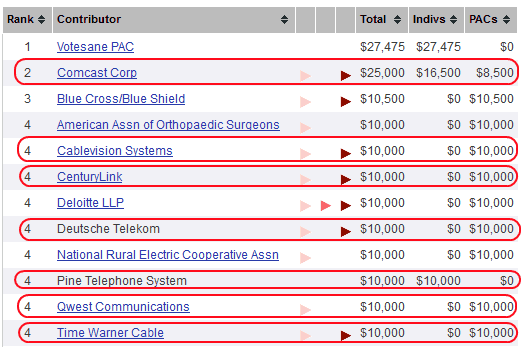The Federal Communications Commission has announced the composition of its new Open Internet Advisory Committee to help track and evaluate the effects of the agency’s Net Neutrality policies, but has no member directly representing the interests of consumers.
The OIAC will focus on important Net Neutrality policies like transparency, reasonable network management practices, the differences governing policies for wired and wireless broadband, and issues like usage caps and speed throttling. But there are no voices on the committee that speak directly on behalf of end users — individual customers who use the Internet in their daily lives.
The FCC instead packed the panel with business, social policy and educational interests, many with direct financial ties to large telecommunications companies.
Selected members include:
- Harvey Anderson, Vice President of Business Affairs & General Counsel, Mozilla
- Brad Burnham, Founding Partner, Union Square Ventures
- Alissa Cooper, Chief Computer Scientist, Center for Democracy & Technology
- Leslie Daigle, Chief Internet Technology Officer, Internet Society
- Jessica Gonzalez, Executive Board, Media and Democracy Coalition; Vice President for Policy & Legal Affairs, National Hispanic Media Coalition (representing NHMC)
- Shane Greenstein, Professor and Kellogg Chair of Information Technology, Kellogg School of Management, Northwestern University
- Russell Housley, Chair, Internet Engineering Task Force; Founder of Vigil Security, LLC (representing Vigil Security, LLC)
- Neil Hunt, Chief Product Officer, Netflix
- Charles Kalmanek, Vice President of Research, AT&T
- Matthew Larsen, CEO, Vistabeam
- Kevin McElearney, Senior Vice President for Network Engineering, Comcast
- Marc Morial, President & CEO, National Urban League
- Elaine Paul, Senior Vice President, Strategic Planning, The Walt Disney Company
- Jennifer Rexford, Professor of Computer Science, Princeton University
- Dennis Roberson, Vice Provost & Research Professor, Illinois Institute of Technology (representing T-Mobile)
- Chip Sharp, Director, Technology Policy and Internet Governance, Cisco Systems
- Charles Slocum, Assistant Executive Director, Writers Guild of America, West
- Marcus Weldon, Chief Technology Officer, Alcatel-Lucent
- Michelle Zatlyn, Co-Founder & Head of User Experience, CloudFlare
Missing are the voices of consumers who want an open Internet and do not believe in Comcast and AT&T’s definitions of “reasonable network management” that include Internet Overcharging schemes like usage caps and overlimit fees.
Consumers will instead have to depend on Internet businesses and institutions that coincidentally share an active dislike of traffic control measures, primarily for their own business reasons.
By excluding the consumer’s voice in policy debates, it is no wonder FCC Chairman Julius Genachowski increasingly seems amenable to the companies he is supposed to independently oversee — spending a considerable amount of time opening industry conventions with keynote speeches, reviewing lobbyist briefs about various communications issues, and talking directly with the corporate leadership of the companies involved. It is disturbingly clear he is listening less and less to consumers. A clear sign of that was his vocal support for the kinds of usage-based Internet pricing schemes that consumers generally loathe.
Genachowski and his staff need to spend more time listening to individual Internet users and the customers of providers and less time attending industry-sponsored events.
The OIAC is a good place to start. Consumers deserve a seat at the table in a debate that will impact every American Internet user.


 Subscribe
Subscribe





